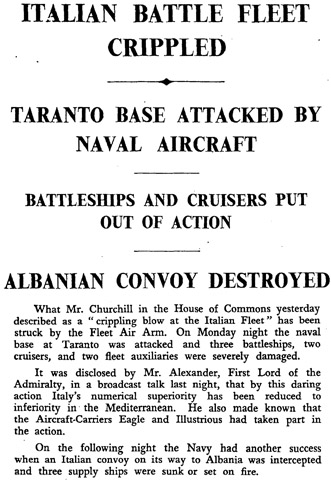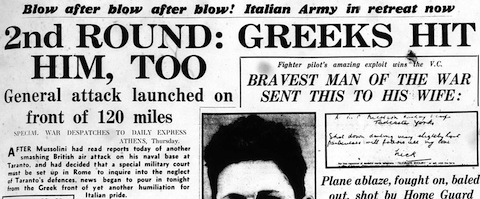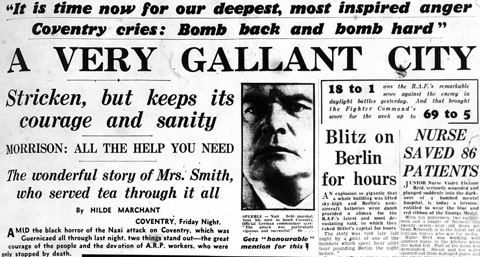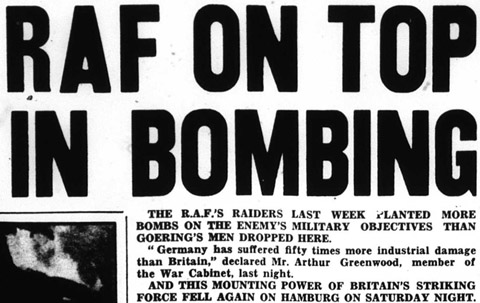I have an embarrassment of Sunday papers now: the Observer, the Sunday Express, News of the World and The People. The last named (which has sales of more than 3 million per issue) has Coventry on the front page, but halfway down and underneath a photograph of a pig (I couldn’t say why). US-British cooperation, the brave HMS Jervis Bay and the Italian evacuation of Koritza in the face of the Greek advance are the stories which are given top billing instead.

The other three have chosen Coventry as their lead story. The Sunday Express has this banner headline stretching the entire width of the front page. The story, written by Geoffrey Winn, continues on the back page where the headline is explained as a conversation overheard in the Cathedral (12):
Round me there are old folk, three generations together, grandfather, daughter, son. All of them week have not only looked on the cathedral as the centre point of their city. But have entered there to pray.
AT MY SIDE I HEAR SOME ONE SAY, IN A QUIET VOICE TO A BOY IN AIR FORCE UNIFORM: “PLEASE GOD, YOU WILL AVENGE WHAT WAS DONE TO US AND OUR BEAUTIFUL CATHEDRAL ON THURSDAY NIGHT.”
He nods, too moved to speak. Then another voice said to some one else near-by: “Excuse me. But please remember this is still a church.”
With a murmur of apology the man at once removes his hat.
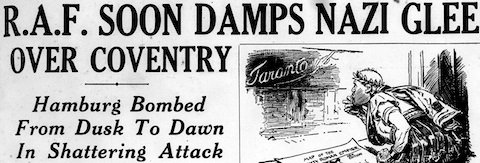
According to News of the World (certified net sales of more than 4 million), the RAF’s vengeance was swift. Hamburg was bombed in a dusk-to-dawn raid on Thursday night: ‘wave after wave of our heavy bombers pounded docks, power stations, gasworks, and railway yards in all parts of the city’ (1). In fact most of the story is given over to the Hamburg raid, aside from a couple of references in the opening paragraph:
GERMAN exultation over the “murder raids” on Coventry was swiftly changed to howls of anger and frenzied threats of reprisals yesterday by the news that the R.A.F. had carried out a shattering attack on Hamburg, second largest city in the Reich.
A story on the back page reports on the King’s visit to the ‘stricken’ city: ‘King’s day in city of courage. Coventry shows her brave face to the world’ (12). In fact all of the newspapers today devote extensive space to this morale-booster, with descriptions of crowd reactions like the following:
As the King, in Field Marshal’s uniform, got out of his car to walk into the Council House, there was a cry from a bystander of: “Up with the King and down with the Nazis!”
“We can take it”, shouted another. “Give the ‘Jerrys’ a bit of what they’ve given us.”
There are no more hints in these reports of anxiety and fear, as there were in Hilde Marchant’s report yesterday. While it is frankly admitted that Coventry ‘faces some colossal problems’, News of the World would clearly rather talk about the spontaneous singing of the National Anthem and the ‘brand new Union Jack [which] floats above the biggest pile of wreckage in the centre of the city’ than recovery and reconstruction.

In its headlines, the Observer combines both themes of royal consolation and aerial reprisal (though that last is a word which seems to have disappeared from the public discourse since September). However, in its main article on Coventry it lays stress upon the smooth workings of the post-raid welfare services:
Rest centres for miles around were staffed, thousands of blankets collected, and numerous mobile canteens stocked with food.
Field kitchens were obtained.
Members of the W.V.S. were marshalled to drive cars and help in a hundred other ways.
Some of these matters were well in hand very shortly after the raid came to an end. Yesterday most of them were properly organised.
Much of the credit for this goes to the local Regional Commissioner, the Earl of Dudley, who took charge of a ‘sort of miniature Government’ (in the Home Secretary’s words) as soon as disaster struck. ‘The amazing thing [Morrison continues] is that within a few hours the whole of it is working in this splendid way’.
Oddly — at least it seems so to me — none of the Sunday newspapers even mention Coventry in their leading articles. Even the aeronautical correspondents (where available) don’t seem that interested in Coventry. Oliver Stewart in the Observer suggests that the RAF might try a similar experimental, ‘intensive raid on some relatively small-area objective with the aim of blotting it out’ (7); C. C. Turner in News of the World even says that Coventry was a ‘legitimate target so far as its armaments workshops are concerned’ (7). If Coventry was a shock then the effect seems to have worn off quite quickly. It’s back to total war as usual.
![]() This work is licensed under a Creative Commons Attribution-NonCommercial-NoDerivatives 4.0 International License.
Permissions beyond the scope of this license may be available at http://airminded.org/copyright/.
This work is licensed under a Creative Commons Attribution-NonCommercial-NoDerivatives 4.0 International License.
Permissions beyond the scope of this license may be available at http://airminded.org/copyright/.


